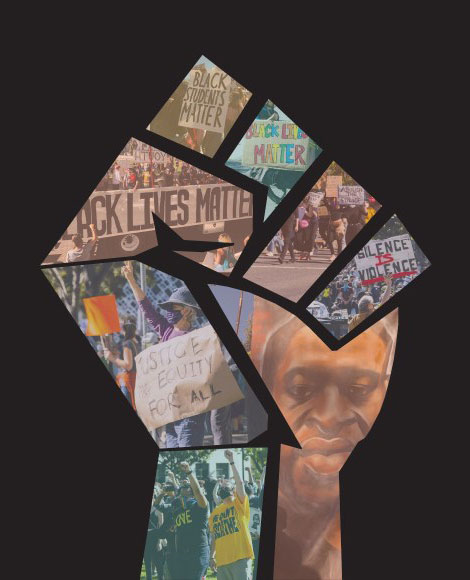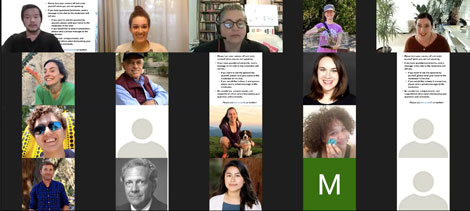A Moment of Real Change
By Kirsten Mickelwait
 Photo credit: Melissa Mulia |
There is universal agreement that, when George Floyd died at the hands of Minneapolis police on May 25, the conversation around racial justice in this country fundamentally changed. The Black Lives Matter (BLM) movement, founded seven years before, suddenly shifted into a higher gear. Across the U.S., issues of systemic racism and equality took on new urgency.
Things also began to change within the Department of Integrative Biology. Although diversity, equity, and inclusion (DEI) had been a priority in the department for years, it was clear that the time had come for more honest dialogue and more decisive action. One catalyst was a heartfelt letter from IB’s graduate students to its faculty asking for greater support and affirmation of Black and Brown lives. Their specific requests included a firmer commitment against racist and exclusionary behavior by PIs in their labs; that the department put actions into words in denouncing racism; and that programs promoting diversity, equity, and inclusion be made more robust.
Faculty members responded with a letter of their own, acknowledging that “our department, and the life sciences research community more generally, has suffered from a history of racism and exclusion of underrepresented groups, and continues to do so.” They pledged solidarity with BLM and promised that they would take actionable steps that had been voted on. These steps included 1) developing annual trainings related to diversity, equity, and inclusion; 2) implementing annual community surveys and wellness check-ins between students and the Diversity Committee; 3) increasing the visibility and accessibility of the equity advisers; 4) looking into devoting department funds and resources to encourage DEI-focused research and activities; and 5) advocating for a fundamental rethinking of police behavior on campus.
IB professor and equity adviser Paul Fine agrees that the university and the department have long ignored the systemic racism that has persisted at every level of academia. “We live in a racist society,” he says. “All elite universities are institutions that reinforce structural inequality. It’s always easier for privileged white people to have the loudest voices—at the faculty level, in PhD programs, at the undergrad level. These inequities compound the fact that we don’t even have a high school system that equalizes opportunity for its students.”
But Fine also feels that we are in a moment of real, systemic change. Equity advisers have built coalitions across campus. A cluster hire of five new faculty in the life sciences and other successful recent hires have helped to change IB’s demographics. “The younger faculty feel very united and are way more diverse than our older faculty,” Fine says. “They’ll be the real leaders.” At the end of the day, “Our goal is that the university and our department match the demographics of California, that everyone can feel that this is their university and their department.”
inclusiveIB Symposium
 On August 25, about 130 IB faculty, students, and staff attended the first virtual inclusiveIB Symposium to discuss issues around justice, equity, diversity, and inclusion (JEDI) with a particular focus on unconscious bias and ableism in academia. Two graduate student coordinators—Jessica Aguilar and Jaemin Lee—organized the day-long event that explored “actionable things that we can bring to our departmental interactions or our smaller lab/classroom/museum communities,” says Aguilar. A grant for student-initiated projects from the Big Community Fee Referendum made the event possible.
On August 25, about 130 IB faculty, students, and staff attended the first virtual inclusiveIB Symposium to discuss issues around justice, equity, diversity, and inclusion (JEDI) with a particular focus on unconscious bias and ableism in academia. Two graduate student coordinators—Jessica Aguilar and Jaemin Lee—organized the day-long event that explored “actionable things that we can bring to our departmental interactions or our smaller lab/classroom/museum communities,” says Aguilar. A grant for student-initiated projects from the Big Community Fee Referendum made the event possible.
Inspired by the inaugural iMCB symposium in 2018, Aguilar began thinking about ways to bring a similar event to IB. After receiving the grant, she and Lee planned and implemented the conference, unexpectedly learning a lot about conducting Zoom events during the pandemic. Also involved and supportive throughout the process were graduate students on the IB DEI committee—Ana Lyons, Kwasi Wrensford, Jenna Ekwealor, Emily King, Betsabe Castro Escobar, Kelsey Crutchfield-Peters, and Lawrence Wang—grad advisers Monica Albe and Carina Galicia, and the CCB DEI committee.
All involved felt the event was a great success, despite the Zoom challenges. “I’m really looking forward to future inclusiveIB symposiums when we can all be together in the same space,” Aguilar says. “But one benefit to Zoom is the ability to invite speakers from anywhere in the world—we had Dr. Fiona Kumari Campbell speaking from Scotland!”
Interested in joining IB’s students and faculty to continue the conversation on race and make systematic changes that benefit Black, Indigenous, and People of Color (BIPOC)? Check out our DEI resources
Back to Main Fall 2020 Newsletter Page







